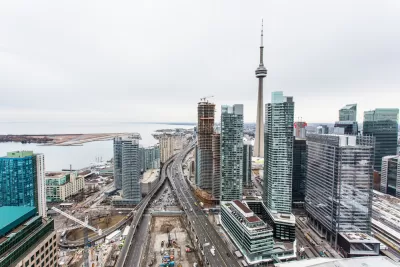The most ambitious example of the almost-mythological "smart city" will be tested in the Quayside district in Toronto as result of a partnership between Sidewalk Labs and Waterfront Toronto.

Last week saw the release of additional details about a partnership between Waterfront Toronto and Sidewalk Labs, a unit of Google's parent company, Alphabet. The announcement event builds fanfare beyond the initial revelation of the partnership earlier in October.
The partnership would "map out a new kind of neighbourhood on Toronto's waterfront that could demonstrate how data-driven technology can improve the quality of city life," according to an article by Alex Bozikovic.
Under the initial terms of the partnership, Sidewalk Labs will invest an initial $50 million into a year-long planning process for a 12-acre district on the Toronto waterfront.
"If the initiative proceeds, it would include at least 3.3 million square feet of residential, office and commercial space, including a new headquarters for Google Canada, in a district that would be a test bed for the combination of technology and urbanism," writes Bozikovic.
Sidewalk Labs also released this week a 220-page document laying out its initial ideas for the project, which Bozikovic summarizes as follows:
Within the area it develops, private cars would be banned; streets would be served by autonomous vehicles and freight robots moving in underground tunnels. Intelligent signals would manage traffic on pedestrian-friendly streets; buildings would be designed to be highly flexible, constructed using modular units that are produced nearby. These would be home to what Sidewalk describes as a "radical" mix of offices, retail, residence and maker spaces, a blend which would challenge existing zoning and building-code regulations.
For additional reading on the technological and urban ambition of the Waterfront Toronto-Sidewalk Labs partnership, see also an article by Emily Badger for The New York Times.
FULL STORY: Google's Sidewalk Labs signs deal for 'smart city' makeover of Toronto's waterfront

Maui's Vacation Rental Debate Turns Ugly
Verbal attacks, misinformation campaigns and fistfights plague a high-stakes debate to convert thousands of vacation rentals into long-term housing.

Planetizen Federal Action Tracker
A weekly monitor of how Trump’s orders and actions are impacting planners and planning in America.

San Francisco Suspends Traffic Calming Amidst Record Deaths
Citing “a challenging fiscal landscape,” the city will cease the program on the heels of 42 traffic deaths, including 24 pedestrians.

Defunct Pittsburgh Power Plant to Become Residential Tower
A decommissioned steam heat plant will be redeveloped into almost 100 affordable housing units.

Trump Prompts Restructuring of Transportation Research Board in “Unprecedented Overreach”
The TRB has eliminated more than half of its committees including those focused on climate, equity, and cities.

Amtrak Rolls Out New Orleans to Alabama “Mardi Gras” Train
The new service will operate morning and evening departures between Mobile and New Orleans.
Urban Design for Planners 1: Software Tools
This six-course series explores essential urban design concepts using open source software and equips planners with the tools they need to participate fully in the urban design process.
Planning for Universal Design
Learn the tools for implementing Universal Design in planning regulations.
Heyer Gruel & Associates PA
JM Goldson LLC
Custer County Colorado
City of Camden Redevelopment Agency
City of Astoria
Transportation Research & Education Center (TREC) at Portland State University
Jefferson Parish Government
Camden Redevelopment Agency
City of Claremont




























